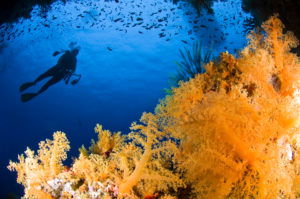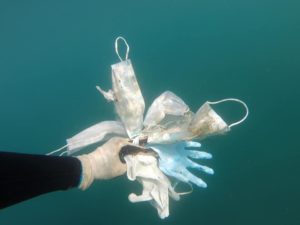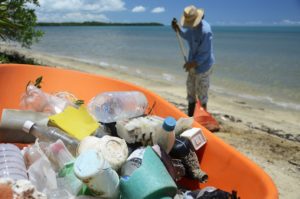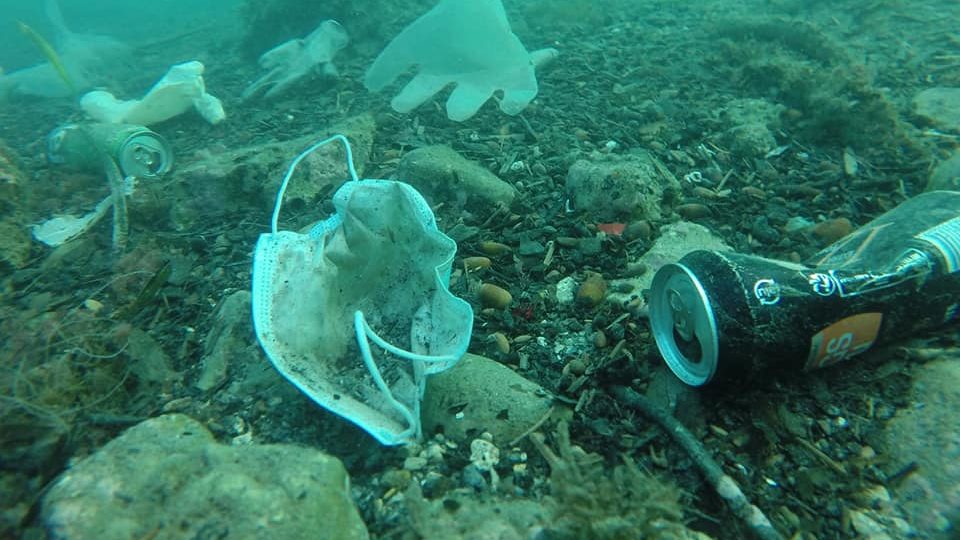Shores See Surge in Pollution, Overfishing during Pandemic
Ahead of World Oceans Day, Israeli marine conservationists say Mediterranean has seen no relief from lockdowns – although a UN expert is hopeful the tides might turn
Ahead of World Oceans Day, Israeli marine conservationists say Mediterranean has seen no relief from lockdowns – although a UN expert is hopeful the tides might turn
By Maya Margit / The Media Line
When the novel coronavirus outbreak swept the world, some were hopeful that shutdowns and the temporary reduction in human mobility could provide the world’s oceans with a much-needed chance to recover from marine pollution and overfishing.
When it comes to Israel’s coastal waters, however, that optimism has proven to be futile. In fact, ahead of World Oceans Day on June 8, marine conservationists are saying that the pandemic has led to a drastic rise in plastic pollution.
“You can see masks, gloves and plastic debris everywhere on the beaches and in the water,” Michael Raphael, national coordinator of Mediterranean People Campaign, told The Media Line, referring to the period following lockdowns.
“There was a minute of quiet,” he said, “but now everyone is going back to single-use plastics because they’re afraid.”
The Mediterranean People Campaign is a non-profit coalition of Israeli environmental organizations that is pushing for the establishment of regulated marine-protected areas (MPAs) in the Mediterranean Sea. MPAs help preserve marine life by restricting human activity and fishing, as well as industrial and commercial activities.
This year, the coalition is hosting a series of virtual and actual events for World Oceans Day, with a special focus on the pressing issues affecting Israel’s coastal waters.
In fact, ahead of World Oceans Day on June 8, marine conservationists are saying that the pandemic has led to a drastic rise in plastic pollution.

A diver admires a coral reef. (tswinner/iStock Photo)
“There are 250 million people who live around the Mediterranean,” Raphael noted. “The sea has a small opening on one side and it takes about 100 years for the water to even change, so there’s a lot of pressure on it, and in order to protect it, we’re going to have to declare large areas of the Mediterranean… MPAs.”
Raphael emphasizes that Israeli waters currently have one large protected area that is about 120 square kilometers in size, or roughly 46 square miles. The coalition, he says, is working with the country’s Nature and Parks Authority to establish six additional zones.
“Citizens need to realize that we’re in a climate crisis and if we don’t act now, we’re going to lose some of our most important ecosystems,” he warned.
A French environmental NGO calling itself Operation Mer Propre (Operation Clean Sea) has similarly sounded the alarm, noting that surgical masks, latex gloves and other single-use plastics are piling up on the sea floor off France’s southern coast. According to a Facebook post from late May, members of the group were able to retrieve dozens of disposable items during a short dive.

Masks and gloves are retrieved from the sea off southern France. (Operation Clean Sea/Facebook)
While such objects might be piling up on ocean floors the world over, some ecologists believe Israel needs to focus on more urgent problems.
Alon Rothschild, biodiversity policy manager at the Society for the Protection of Nature in Israel (SPNI), tells The Media Line that commercial fishing has continued unabated and might even have increased during the lockdowns.
“I don’t think the ocean got the relief it could have [received],” he said. “After decades of neglect, we shouldn’t delude ourselves into thinking that even a two-month break is substantial enough. We need to set mechanisms that are sustainable.”
According to Rothschild, the eastern Mediterranean faces three major challenges: overfishing, a lack of marine reserves and a lack of regulation for the oil and gas industries that are drilling off Israel’s shores.
“The biggest challenge in oceans… is fishing,” he explained. “The reason it’s so destructive is because it takes out major portions of animal life… Ninety percent of the big fish in the oceans are already gone because they have been fished, so once you take this huge portion out of the ecosystem, you change it.”
Notably, fishing nets trap non-commercial fish and further upset the balance to marine life. Rothschild says that in Israel, an estimated 3,000 sea turtles are caught in fishing gear each year and often end up dying.
Another fishing method wreaking havoc on marine habitats is bottom trawling, a practice in which a large net is dragged along the sea floor.
“[Trawling] takes out everything in its way, like corals, sharks or stingrays,” Rothschild said. “It damages the bottom of the ocean itself.”
The second issue facing Israeli coastal waters is the lack of marine prereserves. While the country has ratified international treaties and promised to protect at least 10% of its waters, Rothschild says that so far, only 3% are protected. Scientists, in fact, are calling for 30% of the world’s oceans to be proclaimed protected areas.
“The SPNI and the Blue Half [marine program], together with the National Parks Authority, are promoting a plan to designate 20% of the Mediterranean for MPAs, and we are struggling to push it” among Israeli policy-makers, Rothschild related.
He notes that fishermen and the Agriculture Ministry have long opposed the plan.

A person cleans a beach. (Roijoy/iStock Photo)
The third major issue facing Israel, he says, is ensuring that environmental legislation is in place to protect marine life more than 20 miles off the coast in its Exclusive Economic Zone.
“Israel is allowing the gas industry to drill there, but there is no legislation for environmental control,” he argued.
Others agree that over-fishing remains the biggest threat to the well-being of oceans, followed closely by single-use plastics.
“By 2030, we’ll have more plastic than fish in the sea,” Dr. Stefanos Fotiou, director of the Environment and Development Division at the United Nations ESCAP (Economic and Social Commission for Asia and the Pacific), told The Media Line.
“We know that plastic has gone into our food chain,” he said. “Micro-plastics have been identified in feces and human blood as well. But I think we still have some chance to correct the problem.”
Fotiou argues that pandemics might actually have a role to play in the rehabilitation of marine health. He cites “Changing Sails: Accelerating Regional Actions for Sustainable Oceans in Asia and the Pacific,” a UN report released last month that suggests lockdowns can indeed provide ocean environments with a much-needed breather from human activity.
“It’s a short-term snapshot,” Fotiou said of the report. “We see less transport and less economic activity, which means fewer greenhouse gas emissions. At the same time, the COVID-19 crisis indicates that the use of plastic has been increasing with packaging and delivery services.”
Nevertheless, he sees the pandemic as a window of opportunity that could catalyze long-term change.
“I don’t know what will happen, but I hope that with the impact of this global event… leaders are thinking in a different way,” he said.
“We should not forget that there’s a very big relationship between what happens in the sea and what happens on land,” he stressed. “Without a healthy ocean, we [can] stop talking about preserving life on Earth as we know it.”


